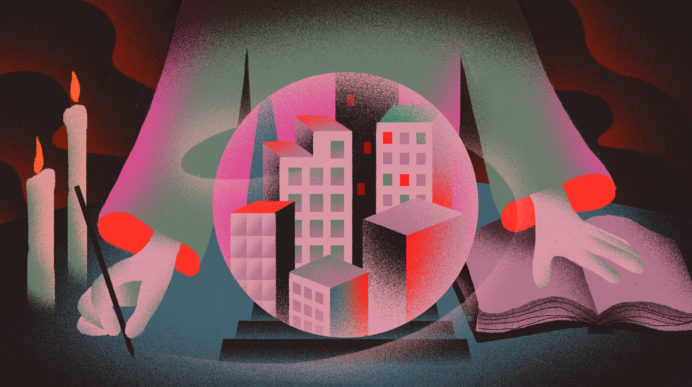Concrete & Ink: Storytelling and the Future of Visionary Architecture
Is there a path between utopian and dystopian visions of future cities? What role can storytelling have in our urban imaginaries? This three-day interdisciplinary programme brings together writers, poets, artists, filmmakers, architects, philosophers, urbanists, curators and academics to search for alternative modes of narrating the future of buildings, housing estates and cities.
Thursday 13 February 7pm-9pm
– £9.50/£7.50 concs
Opening Panel
In this opening panel discussion chaired by architecture and design curator Meneesha Kellay, philosopher Julian Baggini, design strategist Corina Angheloiu and writer Sophie Mackintosh set the scene for the weekend’s debates on imagination, time, future and alternative possibilities of narrating what’s to come.
Friday 14 February, 1.30 – 6pm
– £12.50/£10.50 concs
On Time and Future
This second day of discussions focusses on time and future through two panel discussions that will attempt to expose conventional concepts of time moving constantly ahead in a straight line from past to future and challenge narratives of linear, forward planning.
To Infinity & Beyond: What is Time?
How do artists, writers and architects deal with real and imaginary time? How do they form mechanisms that allow for both obsolescence and maturity? Is the future always in front of us?
Chaired by Theatrum Mundi’s Justinien Tribillon, this session looks at alternative concepts of time to challenge ideas of the future and how it can be narrated across art and architecture, including contributions from choreographer Adesola Akinleye, writer Crystal Bennes and games developer Jodie Azhar.
Urban Planners or Necromancers? Of Blueprints & Crystal Balls
What does it mean to plan? Is the idea of planning the urban a chimera? Can anticipation be a science or is it more to do with magic? Can we bend planning to be less linear and more circular?
In this session chaired by architect and curator Océane Ragoucy, we bring together artists that craft narratives of the future and professional planners who develop foresight for immediate action. It will include contributions by writer Nina Leger, urbanists and researchers Emmanuelle Chiappone-Piriou and Gwenaëlle d’Aboville.
Saturday 15 February, 11am – 6pm
– Walk: Free, booking required
– Screening: £9.50/£7.50 concs
On Walking and Dreaming
Join a walk led by artistic director of Harlow Art Trust Kate Harding and filmmaker Christopher Ian Smith in Harlow Town, Essex, exploring the design and architecture of the prime example of the visionary and utopian New Towns movement. Meet at Gibberd Gallery (Civic Centre, The Water Gardens, Harlow, Essex CM20 1WG) at 11am, dress warm and wear comfortable shoes.
Red Dreams: future of architecture until 1989
Back at Whitechapel Gallery, the afternoon session explores what happens when visionary utopias decay or collapse? Can they become something other than dystopias? This session questions the pre- of the post- by bringing together artists, historians and architects who have experienced, narrated, studied and critiqued the urban utopia of Socialism, the future of cities of yesteryear.
Featuring screening of Jasmina Cibic’s Tear Down and Rebuild (2015, 15 min) followed by a panel including filmmaker Christopher Ian Smith, urbanist Gruia Bădescu and writer Alison Irvine, chaired by Theatrum Mundi’s Marta Michalowska.
The afternoon will conclude with screening of Christopher Ian Smith’s New Town Utopia (2017, 80min)
Adesola Akinleye is an artist-scholar choreographer. She began her career as a dancer with Dance Theatre of Harlem (USA), later working in UK Companies such as Green Candle and Union. Over the past twenty years she has created dance works ranging from live performance that is often site-specific and involves a cross-section of the community to dance films, installations and texts. Her work is characterised by an interest in voicing people’s lived-experiences in Places through creative moving portraiture. A key aspect of her process is the artistry of opening creative practices to everyone from ballerinas to women in low wage employment to performance for young audiences.
Alison Irvine’s first novel This Road is Red was based on the true stories of residents of Glasgow’s Red Road Flats. It was shortlisted for the 2011 Saltire First Book of the Year Award. She is the writer in the artist collective Recollective (www.recollective.org.uk). Their practice involves documenting the stories and experiences of people in relation to the places in which they live and work. Recently they have completed Barrowland Ballads, a book of essays, photos and illustrations of the staff, musicians and gig-goers at Glasgow’s famous Barrowland Ballroom. Her second novel, Cat Step, will be published by Dead Ink in Spring 2020.
Christopher Ian Smith is a writer and director from the UK. His work crosses documentary and fiction, crafting narratives that explore our relationship with folklore, landscape and architecture. His short films have screened at film, photography and art festivals globally, including Arterial (2012), Cumulus (2014) and Sulphur (2016). In 2018, his feature doc New Town Utopia was released theatrically to widespread acclaim. New Town Utopia is a cross-platform project comprising a publication of poetry, theory and photography and the video installation New Town Utopia x Magic Party Place – exhibited at the Sharjah Biennale, Format Photography Festival and Rich Mix, London.
Corina Angheloiu is a design strategist, researcher and facilitator in pursuit of ways to foster systemic change and perpetually curious about the role cities can play in enabling this. She is Senior Design Strategist for the global sustainability non-profit Forum for the Future, where she coaches initiatives and organisations tackling complex sustainability challenges – from ocean plastics to urban adaptation. In parallel, she’s a PhD candidate in the Centre for Environmental Policy at Imperial College, where she investigates how design futures method can bridge theory – implementation gaps in urban resilience.
Crystal Bennes is an Edinburgh-based artist, writer and researcher exploring topics from science to architecture.
Emmanuelle Chiappone-Piriou works as an independent author and curator. She trained as an architect (ENSA La Villette) and architecture historian (Paris 1 Panthéon-Sorbonne). Her current research and projects focus on the frictions between architecture, art and computation and their political and aesthetical implications. She is a PhD candidate and external lecturer at TU Wien, and a lecturer at ENSA Paris Malaquais. Emmanuelle has collaborated to numerous exhibitions and publications, notably at Centre Pompidou and OMA/AMO. From 2011 to 2016, she held the position of Program Curator at the Frac Centre, co-curating Naturalizing Architecture (2013), The City as a Vision (2014) and Reliefs (2015).
Gruia Bǎdescu is an urbanist whose research and practice explore the relationship between urban interventions and political transitions, mainly in post-socialist and post-war contexts. He is a Humboldt fellow in Konstanz, Germany, where he is working on a book on architecture and dealing with the past. Gruia holds a PhD in Architecture from the University of Cambridge, with a dissertation on urban post-war reconstruction in the former Yugoslavia. He has written also on reconstruction in Beirut, on post-socialist urbanism, as well as urban transformations in the aftermath of dictatorships in Romania, Chile, and Argentina. He currently lives and works between Konstanz and Bucharest, where he is teaching, developing urban strategies, and working with ATU, an urban think-tank.
Gwenaëlle d’Aboville is urbanist. She co-founded the French agency Ville Ouverte in 2004. With her team of urbanists, architects and cartographers, she works for French cities, planning agencies, private or public housing agencies in the fields of planning and urban projects. Public participation is part of all their works as a way to building better, more sensible and sustainable programs.
Jodie Azhar is the CEO of Teazelcat Games, a studio focused on story-driven games, where she is currently directing their unannounced debut title. Prior to this she spent a decade working as a technical artist at various game development studios, most recently as the Technical Art Director for the Total War franchise at Creative Assembly. She is an award winning developer, in 2019 was featured as one of 100 of the most influential women in games in the UK, and in 2016 was one of BAFTA’s Breakthrough Brits.
Julian Baggini is the author, co-author or editor of over 20 books including How The World Thinks, The Virtues of the Table, The Ego Trick, Freedom Regained (all Granta) and The Edge of Reason (Yale University Press). He was the founding editor of The Philosophers’ Magazine and has written for numerous newspapers and magazines, as well as for the think tanks The Institute of Public Policy Research, Demos and Counterpoint. He is Academic Director of the Royal institute of Philosophy and an Honorary Research Fellow at the University of Kent. His website is www.microphilosophy.net
Justinien Tribillon is a Associate Director for Europe at Theatrum Mundi. Justinien has co-founded and is an editor of Migrant Journal, a six-issue publication looking at migration in all its forms and its impact on space. As a writer, Justinien regularly contributes to various publications such as MONU, Failed States or The Guardian. He is regularly invited to give talks and participate to panels, recently at Tate Britain in London, Proyector gallery in Mexico DC, the Gaîté Lyrique in Paris, the British Pavilion at the Venice Biennale of Architecture or at MoMA PS1 in New York city. Justinien is currently a PhD candidate at University College London, Bartlett School of Planning where he is also a tutor in urban studies. His doctoral research is on Paris’s Boulevard Périphérique as a social-spatial border between the city proper and the banlieues.
Kate Harding is a curator and Artistic Director of Harlow Art Trust. The Trust was founded in 1953 with a mission to beautify the post-war New Town of Harlow by commissioning sculpture for its public spaces. The project attracted some of the greatest artists of the 20th century, including Henry Moore, Barbara Hepworth and Elisabeth Frink. Today Harlow is home to an exceptional and growing collection of over 100 artworks, earning it the name Harlow Sculpture Town. She curates four exhibitions per year, three with a focus on sculpture, at the Gibberd Gallery.
Nina Leger is a writer and an art critic. She lives between Paris and Marseille where she teaches Art History at the Ecole des Beaux-Arts. Her critically acclaimed novel Mise en pièces (Gallimard, 2017) won the Prix Anaïs Nin, and is published in English by Granta as The Collection (2019). Nina Leger has been awarded a Lagardère Grant for her upcoming literary project dedicated to the French Technopole Sophia-Antipolis. Her other writings include several texts for artists’ books, exhibition catalogues and art history journals.
Océane Ragoucy is an architect and curator living and working in Paris. As an architect, her personal research mainly focuses on alternative forms of thought and the production of architecture, and what is invisible in space, cities and the underground. This research often takes the form of articles, cultural programmes, exhibitions, fanzines and publications. Since 2012, she has been the director of strategy and R&D at TVK, a French architecture and urban design office. In between others, she is the co-curator of the publishing project Printing on Fire since 2014, has been an artist-researcher associated to the prefiguration of the Villa Medici in Paris’ outskirts in 2015, took part in the Young Researchers Committee of Milano Triennale French Section in 2019 and is a member of Theatrum Mundi Europe board.
Marta Michalowska is Associate Director for the UK at Theatrum Mundi. Marta is a curator, commissioner and artist working across film, photography, installation, literature and public programmes. She is also Director of The Wapping Project, a London-based non-for-profit organisation commissioning and producing new works in visual arts, film, literature and theatre. She trained at the Andrzej Wajda Master School of Film Directing in Warsaw and Central Saint Martins College of Art and Design in London. She is currently working on a novel Sketching in Ashes and a book length essay The Line.
Meneesha Kellay is Curator of Festivals in the Design, Architecture and Digital team at the V&A Museum, London. Previously she ran Open House London, was a Curator at Museum of Architecture and Assistant Director of Night School at the Architectural Association. More recently Meneesha was Public Programmes Curator at the Royal Institute of British Architects where she devised and delivered the cultural programme through talks, installations and exhibitions both in London and internationally. Meneesha has been on the RIBA Architects for Change Advisory Board, was appointed on the 2019 London Festival of Architecture Curation Panel, is a Steering Committee Member for Design Can and is a mentor for the Creative Mentor Network. She has conducted independent projects with the African Architecture Awards and the Baltic Pavilion at the Venice Architecture Biennale 2016.
Sophie Mackintosh was born in South Wales in 1988, and is currently based in London. Her work has been published by Granta, The White Review, The New York Times and The Stinging Fly, among others. Sophie’s debut novel The Water Cure was published in 2018 and long-listed for the 2018 Man Booker Prize. Her second novel Blue Ticket will be published in Spring 2020.



